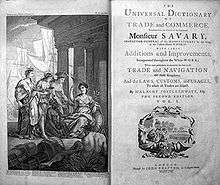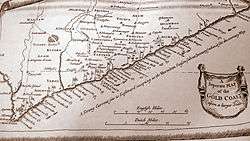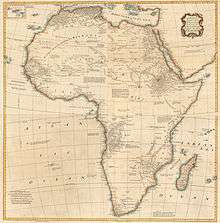Malachy Postlethwayt
Malachy Postlethwayt (1707? – 1767) was a British commercial expert famous for his publication of the commercial dictionary titled The Universal Dictionary of Trade and Commerce in 1757. The dictionary was a translation and adaptation of the Dictionnaire universel du commerce of the French Inspector General of the Manufactures for the King, Jacques Savary des Brûlons.[1]

Postlethwayt wrote several works on the benefits to the British economy from the African slave trade to the colonies in North America.
Life

Born about 1707, Postlethwayt was elected a Fellow of the Society of Antiquaries of London on 21 March 1734.[2] From some time in the 1730s he worked for the Royal Africa Company, and wrote in its defence.[3]
Postlethwayt died suddenly on 13 September 1767. He was buried in the Old Street churchyard, in Clerkenwell, London.[2]
Works
Postlethwayt spent 20 years preparing The Universal Dictionary of Trade and Commerce, London, 1751 (3rd edit. London, 1766; 4th edit. London, 1774), a translation, with large additions, from the French work of Jacques Savary des Bruslons. Postlethwayt collected information, freely plagiarising other writers, but presented his results haphazardly.[2]

Postlethwayt also published:
- The African Trade the great Pillar and Support of the British Plantation Trade in America, &c., 1745.
- The Natural and Private Advantages of the African Trade considered, &c., 1746.
- Britain's Commercial Interest Explained, Vol. I of his Universal Dictionary of Trade and Commerce, 1747.[4]
- Considerations on the making of Bar Iron with Pitt or Sea Coal Fire, &c. In a Letter to a Member of the House of Commons, London, 1747.
- Considerations on the Revival of the Royal-British Assiento, between his Catholic Majesty and the … South-Sea Company. With an … attempt to unite the African-Trade to that of the South-Sea Company, by Act of Parliament, London, 1749.
- The Merchant's Public Counting House, or New Mercantile Institution, &c., London, 1750.
- A Short State of the Progress of the French Trade and Navigation, &c., London, 1756.
- Great Britain's True System. … To which is prefixed an Introduction relative to the Forming a New Plan of British Politicks with respect to our Foreign Affairs, &c., London, 1757.
- Britain's Commercial Interest explained and improved, in a Series of Dissertations on several important Branches of her Trade and Police. … Also … the Advantages which would accrue … from an Union with Ireland, 2 vols., London, 1757; 2nd edit., ‘With … a clear View of the State of our Plantations in America,’ &c., London, 1759.
- In Honour to the Administration. The importance of the African Expedition considered, &c., London, 1758.[2]
Eric Williams cited the work of Postlethwayt on the slave trade in his Capitalism and Slavery (1944).[5]
Notes
- Adam Smith Review Volume 4 by Vivienne Brown p.196
- . Dictionary of National Biography. London: Smith, Elder & Co. 1885–1900.
- Christopher Leslie Brown, Moral Capital: foundations of British abolitionism (2006), p. 270;Google Books.
- Emory R. Johnson, T. W. Van Metre, G. G. Huebner, D. S. Hanchett, History of Domestic and Foreign Commerce of the United States - Vol. 1, p.36–37 Carnegie Institution of Washington, 1915.
- Groenewegen, Peter. "Postlethwayt, Malachy". Oxford Dictionary of National Biography (online ed.). Oxford University Press. doi:10.1093/ref:odnb/22599. (Subscription or UK public library membership required.)
External links
- Attribution
![]()